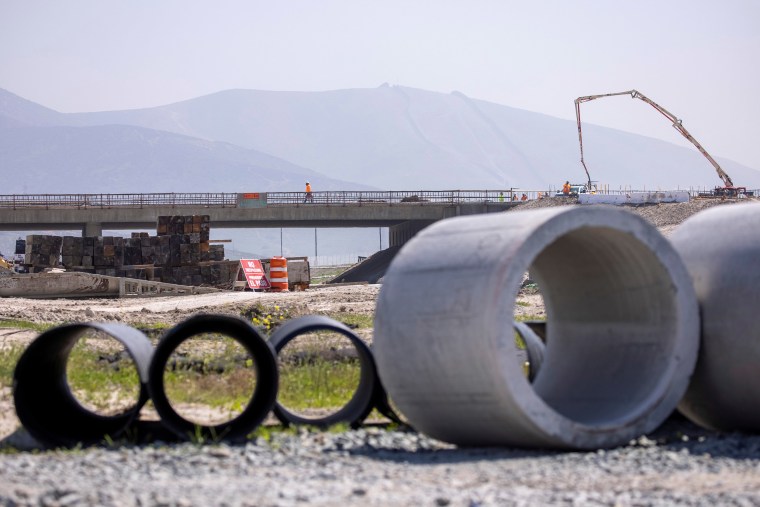After a handful of bipartisan infrastructure meetings with lawmakers, President Joe Biden recently wrapped up a White House discussion by asking Republicans to craft a counterproposal to the American Jobs Plan by mid-May. GOP lawmakers easily beat that deadline, unveiling a blueprint last week.
Though the Republican plan was obviously too small, it did include priorities such as investments in broadband and water-system overhauls, suggesting the GOP was prepared to move past its initial position that only investments in things such as bridges and highways counted as real, actual infrastructure.
It was not immediately clear whether the White House would treat the Republican pitch as a joke or as a serious starting point for negotiations. According to this new Axios report, Team Biden is going with the latter.
Top White House officials have quietly been meeting — on the Hill and over the phone — with Republican senators who drafted a counterproposal to President Biden's infrastructure plan, multiple sources tell Axios.... The GOP senators say they're optimistic the Biden administration is open to concessions and can reach a compromise. They've been heartened by their talks with White House Chief of Staff Ron Klain, counselor to the president Steve Ricchetti and legislative affairs director Louisa Terrell.
The fact that the talks exist is notable, though the report added that the negotiations "remain preliminary," and "both sides are far from reaching any substantial deal."
Given the circumstances, it's probably best to keep expectations low. Not only are Republicans philosophically opposed to making the kinds of investments Biden believes are necessary, but GOP lawmakers continue to balk at raising any tax on anyone by any amount.
What's more, even if the president were to work out some kind of deal with a handful of Senate Republicans, there's little to suggest that 10 GOP senators -- the number necessary to overcome a filibuster -- would be on board with an agreement.
Or put another way, the odds of a major, bipartisan breakthrough remain poor.
But as the discussions advance, an important detail is coming into sharper focus. The price tag on the White House infrastructure plan is $2.3 trillion. Sen. Shelley Moore Capito (R-W.Va.) initially told CNBC an infrastructure package between $600 billion and $800 billion would be in a "sweet spot" for a larger compromise.
Soon after, when Republicans presented their alternative to the American Jobs Plan, the party had moved further away from Biden's offer, not closer to it, unveiling a $568 billion package.
Except, even that wasn't quite right. As Catherine Rampell explained yesterday:
[I]n reality, Republicans are offering nothing remotely close to a serious or reasonable counter-bid, and they know it. This is obvious from their use of an accounting gimmick that inflates their "compromise" and makes it look more similar in size to Biden's plan. Once you un-cook the books and use apples-to-apples budgeting rules to compare the proposals, you'll realize that what the GOP has offered is mere pennies on the dollar of what Biden has requested. Specifically, Republicans have offered to tender 8 cents of new spending for every $1 Biden wants. Even less, in some cases.
The budget games get a little complicated -- it's all about playing with baselines -- but a separate Washington Post analysis explained, "[T]he Senate GOP would propose spending an additional $189 billion, not $568 billion."
It's easy to celebrate bipartisan negotiations and the idea of a breakthrough compromise on a key national priority, but as things stand, to see the Republican position as serious and credible is to make a mistake.
